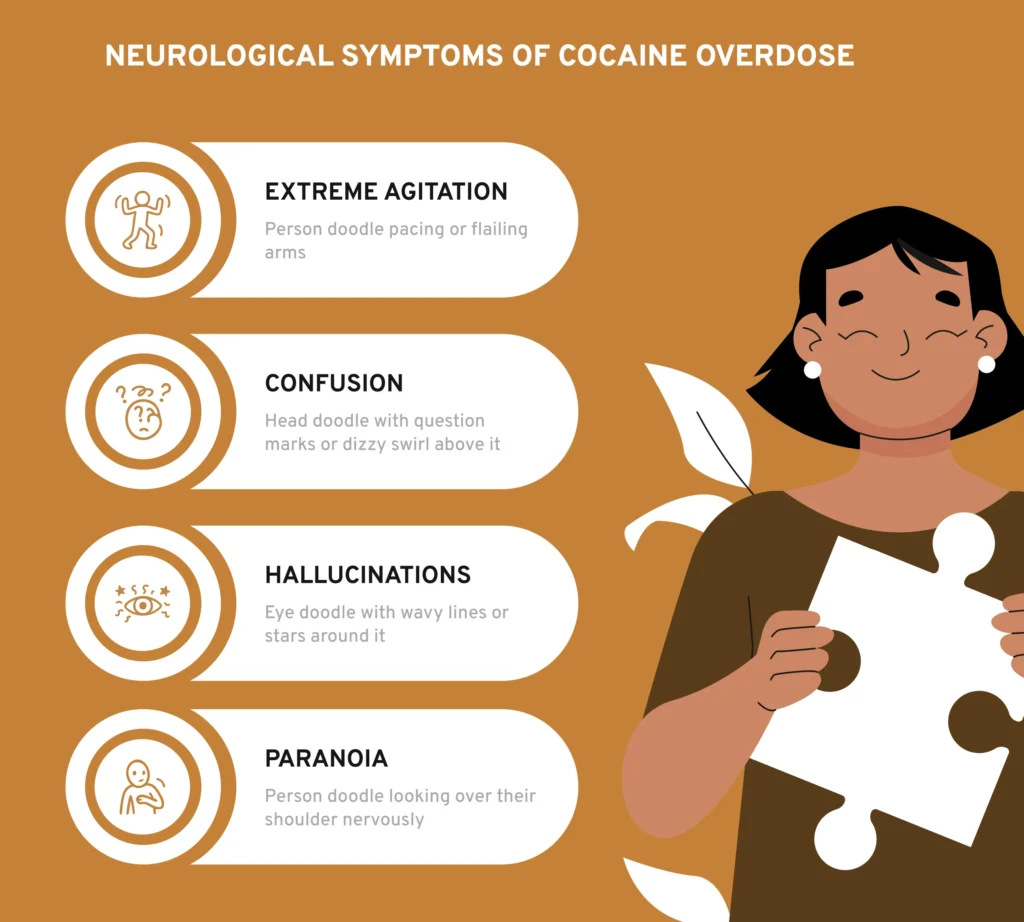Cocaine has long been glamorized as a “party drug,” but the risks it carries are often ignored or misunderstood. Cocaine is a powerful stimulant that floods the brain with dopamine and norepinephrine two chemicals responsible for pleasure and alertness. This rush creates intense feelings of euphoria, confidence, and focus. But what many people do not realize is that these effects come at a very high price. Cocaine puts an enormous strain on the heart, blood vessels, and brain.
Even a single use can result in life-threatening complications, including overdose. Understanding how cocaine affects the body and recognizing the warning signs of overdose can save lives.
Can You Overdose on Cocaine?
Yes, you absolutely can overdose on cocaine and it can be fatal. A cocaine overdose happens when the body cannot process or handle the amount of cocaine present in the system. Cocaine overstimulates the brain, heart, and nervous system, creating a dangerous chain reaction that can result in heart attack, stroke, seizures, or respiratory failure.
The risk of overdose is higher for people who take large amounts of cocaine at once, binge use over a short period of time, or mix cocaine with other substances such as alcohol or opioids.
Street cocaine also comes with an additional danger because its purity is often unknown. Many samples are cut with other drugs, including fentanyl, which is a synthetic opioid that is up to 100 times more potent than morphine. This makes even small amounts of cocaine potentially lethal.
How Much Cocaine Does It Take to Overdose?
There is no single “safe dose” of cocaine, that’s a myth. The amount that can trigger an overdose varies from person to person and depends on several factors, including body weight, drug tolerance, method of use, and the purity of the cocaine.
For example, injecting or smoking cocaine leads to faster and stronger effects compared to snorting, which can make an overdose more likely.
Even people who are using cocaine for the first time have experienced fatal overdoses. This unpredictability is one of the main reasons cocaine is so dangerous, you can never be certain how your body will react.
Signs and Symptoms of Cocaine Overdose
Cocaine overdose symptoms can appear suddenly and escalate very quickly, so knowing what to watch for is critical. Physical symptoms often start with chest pain, a very fast or irregular heartbeat, and shortness of breath. Many people begin sweating heavily and may experience nausea, vomiting, or a dangerously high body temperature that feels like the body is overheating.

Neurological symptoms can be just as alarming.
These may include:
- extreme agitation
- confusion
- hallucinations
- paranoia. (Infograph added here)
In severe cases, the person may lose consciousness or experience seizures. Without immediate medical intervention, these symptoms can lead to fatal complications such as a stroke or cardiac arrest. Recognizing these signs early and getting emergency medical help can mean the difference between life and death.
Cocaine-Related Deaths
Most deaths related to cocaine use are caused by heart attacks, strokes, or seizures. Cocaine is especially hard on the heart because it stimulates the cardiovascular system in multiple ways. It constricts the blood vessels, raises blood pressure, and makes the heart beat faster. These effects force the heart to work harder while also limiting the amount of oxygen-rich blood it receives.
When the heart is deprived of oxygen under these stressful conditions, the risk of a heart attack skyrockets.
Research shows that the risk of a heart attack is 23 times higher in the first hour after using cocaine. This is why cocaine is sometimes referred to as the “perfect heart attack drug.” While people with pre-existing heart disease or older adults are at a higher risk, even young and otherwise healthy people have suffered fatal heart attacks after using cocaine.
The danger does not stop with the heart. Cocaine can also trigger strokes because it increases the risk of blood clots and damages blood vessels in the brain. Additionally, it lowers the brain’s seizure threshold, which means it can cause life-threatening seizures in people who have never had one before.
Cocaine Overdose Statistics in the U.S.
Cocaine use continues to be a major public health concern in the United States. According to the 2020 National Survey on Drug Use and Health, about 5.2 million Americans aged 12 and older, roughly 1.9 percent of the population reported using cocaine within the past year. Usage rates are highest among young adults aged 18 to 25, where 4.3 percent reported cocaine use in the past year. Around 657,000 people reported using crack cocaine specifically.
What is even more alarming is the dramatic rise in cocaine overdose deaths.
According to data from the National Institute on Drug Abuse (NIDA), the number of cocaine-related overdose deaths jumped from 5,419 in 2014 to 19,447 in 2020. Many of these deaths involved polysubstance use, especially cocaine mixed with synthetic opioids like fentanyl. Because fentanyl is so potent and often mixed into cocaine without the user’s knowledge, it has been a major driver of the rising overdose death rates.
What to Do If Someone Overdoses on Cocaine
If you suspect someone is experiencing a cocaine overdose, it is crucial to act quickly. The first step is to call emergency services right away. While waiting for help to arrive, keep the person safe by monitoring their breathing and pulse.
If they are unconscious, gently roll them onto their side to prevent choking in case they vomit.
It is important not to give them food or drinks or attempt to shock them awake with cold showers, these actions can make the situation worse. When medical professionals arrive, provide as much information as you can, such as how much cocaine was taken and whether other substances were used. This can help them deliver the right treatment quickly.
Cocaine Overdose Treatment
When someone is treated for a cocaine overdose in a hospital, doctors focus on stabilizing their condition and preventing further harm. Medications such as benzodiazepines are often used to calm agitation and control seizures. IV fluids are given to keep the person hydrated, and steps are taken to lower dangerously high body temperature. Continuous heart monitoring is done because of the high risk of heart attack or arrhythmia. In severe cases, oxygen therapy or life support may be necessary.
After the immediate crisis is handled, doctors often recommend that the patient consider addiction treatment. Long-term programs, cocaine addiction treatment, counseling, and support groups play a key role in preventing future overdoses and helping the person stay on the path to recovery.
Preventing Cocaine Overdose
The most effective way to prevent a cocaine overdose is to avoid using cocaine altogether. For people who are not ready to stop, harm reduction measures can lower the risk.
These include:
- avoiding binge use
- never mixing cocaine with alcohol or opioids
- using fentanyl test strips to check for contamination before using the drug.
The safest choice, however, is to seek professional help in a rehab center for cocaine dependence before it leads to life-threatening consequences.
When to Seek Help
If you find yourself craving cocaine more often, increasing your dose to feel the same effects, or feeling unable to stop using, it may be time to seek treatment. Cocaine addiction is a medical condition, not a moral failure, and treatment is available. Professional programs can help you safely stop using, manage withdrawal symptoms, and develop strategies to stay drug-free long term.
Seek help right away
What is cocaine?
Cocaine is a powerful stimulant drug made from the coca plant. It increases dopamine in the brain, creating intense euphoria and alertness, but also puts heavy stress on the heart and brain.
Can a cocaine overdose cause death?
Yes. Cocaine overdose can lead to heart attack, stroke, seizures, or respiratory failure, all of which can be fatal without quick medical help.
What are the life-threatening complications of cocaine intoxication?
Severe complications include heart attacks, strokes, seizures, dangerous heart rhythms, and very high body temperature. These can happen even after a single use.
Can people recover from cocaine addiction?
Yes. With medical detox, therapy, and support, many people fully recover from cocaine addiction and avoid future overdoses.
How long does cocaine stay in your system?
Cocaine is usually detectable in blood for about 12 hours, in urine for 1–3 days (longer for heavy users), and in hair for up to 90 days.


